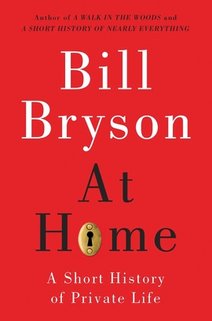
06 Oct 2010 01:12:52
"At Home: A Short History of Private Life" takes readers on a journey through every room of the Victorian parsonage in England where the author lives. Each chapter is named after a room or a part of the grounds ("The Drawing Room," "The Garden," "The Bedroom," etc.) and used as a jumping-off point for Bryson to explore the origins of everything from electricity to ice to crop fertilizers.
You can't open a page and read a few sentences without learning something. How many pounds of pears did the average person eat in 1851? Page 83. Why did Henry VIII slaughter 25,000 oxen in 1513? Page 171. What really killed President James A. Garfield in 1881? Page 335. Whatever Bryson paid his research staff, he should double it.
Those fact-stuffed pages can sometimes make for slow reading, but since this is a nonfiction book without a plot, readers who find themselves not interested in, say, 19th-century botany, can skip to the next room and pick up without missing much except why "guano mania" swept through England in the 1830s.
He has a knack for considering historical things from the modern vantage point, making history come alive better than any textbook. "We forget just how painfully dim the world was before electricity," writes Bryson in "The Fuse Box" chapter. "A candle — a good candle — provides barely a hundredth of the illumination of a single 100-watt lightbulb. Open your refrigerator door and you summon forth more light than the total amount enjoyed by most households in the eighteenth century. The world at night for much of history was a very dark place indeed."
Bryson's gift — just as it was in his 2003 science-for-the-non-scientific best-seller, "A Short History of Nearly Everything" — is his accessible prose. "Almost nothing, it seems, escaped the devious wiles of food adulterers," he writes about mid-17th century food preparation at the start of "The Kitchen" chapter. "Sulfuric acid was added to vinegar for extra sharpness, chalk to milk, turpentine to gin."
As in his acclaimed travel writing, Bryson never misses a chance to point out the absurdity of history. Arsenic in wallpaper, sawdust and urine diets at sea and rotting bodies in sitting rooms — they're all part of how we got here — and how lucky we are to have a writer like Bill Bryson reminding us of the journey.
You can't open a page and read a few sentences without learning something. How many pounds of pears did the average person eat in 1851? Page 83. Why did Henry VIII slaughter 25,000 oxen in 1513? Page 171. What really killed President James A. Garfield in 1881? Page 335. Whatever Bryson paid his research staff, he should double it.
Those fact-stuffed pages can sometimes make for slow reading, but since this is a nonfiction book without a plot, readers who find themselves not interested in, say, 19th-century botany, can skip to the next room and pick up without missing much except why "guano mania" swept through England in the 1830s.
He has a knack for considering historical things from the modern vantage point, making history come alive better than any textbook. "We forget just how painfully dim the world was before electricity," writes Bryson in "The Fuse Box" chapter. "A candle — a good candle — provides barely a hundredth of the illumination of a single 100-watt lightbulb. Open your refrigerator door and you summon forth more light than the total amount enjoyed by most households in the eighteenth century. The world at night for much of history was a very dark place indeed."
Bryson's gift — just as it was in his 2003 science-for-the-non-scientific best-seller, "A Short History of Nearly Everything" — is his accessible prose. "Almost nothing, it seems, escaped the devious wiles of food adulterers," he writes about mid-17th century food preparation at the start of "The Kitchen" chapter. "Sulfuric acid was added to vinegar for extra sharpness, chalk to milk, turpentine to gin."
As in his acclaimed travel writing, Bryson never misses a chance to point out the absurdity of history. Arsenic in wallpaper, sawdust and urine diets at sea and rotting bodies in sitting rooms — they're all part of how we got here — and how lucky we are to have a writer like Bill Bryson reminding us of the journey.

